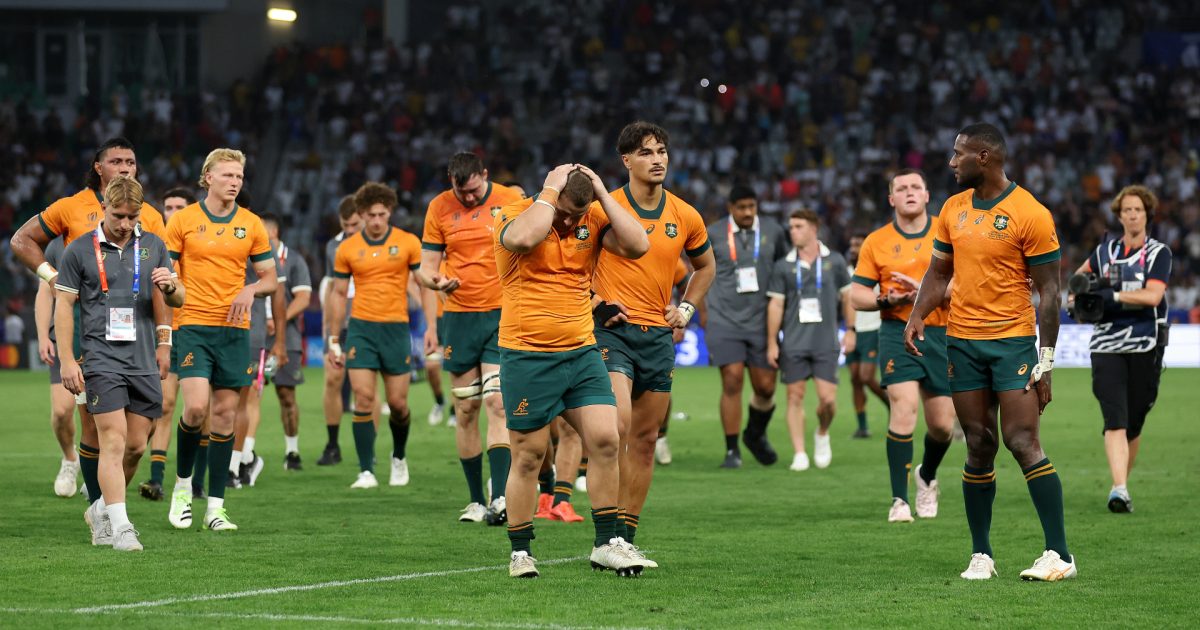Ce qu'il faut savoir sur le match Pays de Galles - Australie

Après le France – Nouvelle-Zélande et l’Afrique du Sud – Irlande, difficile de trouver plus belle affiche. Mais le match entre le pays de Galles et l’Australie à Lyon est peut-être le match avec l’enjeu le plus important du week-end.
La défaite 22-15 des Wallabies face aux Fidji a complètement rebattu les cartes de la Poule C. En cas de défaite, cela en serait fini de leurs espoirs de qualification. Un résultat qui serait malvenu après la déclaration de Phil Waugh, le patron de la fédération australienne, pour qui atteindre une demi-finale serait « acceptable ».
Ben Donaldson passe du poste d’arrière à celui de demi d’ouverture du côté des Wallabies. Carter Gordon sera sur le banc et Andrew Kellaway portera le numéro 15. Par ailleurs, Tate McDermott retrouve le poste de demi de mêlée, Robert Leota sera troisième ligne aile aux côté de Tom Hooper. Le talonneur David Porecki sera capitaine en l’absence de Will Skelton, blessé.
Le pays de Galles compte 10 points sur 10 possibles. Une victoire lui assurerait une place parmi les huit qualifiés pour le phases finales avant le dernière match de poule. Mais ce n’est pas encore gagné.
Le sélectionneur Warren Gatland a rappelé 12 joueurs qui avaient disputé le premier match face aux Fidji, après avoir été mis au repos face au Portugal. Seuls Taulupe Faletau, Louis Rees-Zammit et le capitaine Jac Morgan restent titulaires. Adam Beard fêtera sa 50e sélection pour le pays de Galles et son 51e match international.
HISTORIQUE
L’Australie a remporté 16 de ses 20 derniers matchs face au pays de Galles, dont trois des quatre dernières confrontations en Coupe du Monde de Rugby, notamment le match pour la troisième place lors de la RWC 2011.
MATCH MARQUANT
Septembre 2019. Tokyo Stadium. À ce jour, il s’agit de la seule victoire galloise en phase de poules de Coupe du Monde de Rugby face à l’Australie et ce fut au terme d’un match haletant clôturé sur le score de 29-25. Le pays de Galles a résisté au retour en force des Wallabies, qui sont revenus à 1 point des Gallois à 12 minutes de la fin, après avoir compté 18 unités de retard. La pénalité de Rhys Patchell a scellé le sort du match à la 73e minute.
Il s’agit de la première victoire en Coupe du Monde de Rugby du pays de Galles face à une des trois nations majeurs de l’hémisphère sud.
POINT-CLÉ
Les résultats de l’Australie sont au cœur des discussions de la Poule C. Au cours des 12 derniers mois, les Wallabies n’ont remporté que trois de leurs 15 matchs. Un succès face à la Géorgie au Stade de France, lors du deuxième jour de la Coupe du Monde de Rugby 2023, un autre face à l’Écosse en octobre et contre le pays de Galles en novembre.
LE DUEL
Ben Donaldson face à Dan Biggar. Donaldson passe du poste d’arrière à celui de demi d’ouverture pour le match crucial de l’Australie dans cette Coupe du Monde de Rugby 2023, après que Eddie Jones a relégué Carter Gordon sur le banc. Donaldson était titulaire en 10 pour la première fois face aux Gallois en novembre dernier alors que Biggar était blessé. Les Wallabies s’étaient imposés 39-34 après avoir été menés 34-13 à la 53e minute, moment où Donaldson avait été remplacé par le sélectionneur de l’époque, Dave Rennie.
LA STAT INCROYABLE
Lors de la RWC 2011, le pays de Galles n’a encaissé que cinq essais et 56 points en six matchs (dont 17 points et deux essais lors de la défaite 17-16 face à l’Afrique du Sud lors de son premier match de la compétition). Les Gallois se sont hissés jusqu’au match pour la troisième place, où ils ont concédé deux nouveaux essais et 21 points lors de la défaite face à l’Australie.
L’ARBITRE
Wayne Barnes (Angleterre). L’expérimenté arbitre central a fait ses débuts en 2006 lors du match entre les Fidji et les Samoa. Il a officié pour la première fois en Coupe du Monde de Rugby lors de la rencontre entre la Nouvelle-Zélande et l’Italie, lors de l’édition 2007 en France.
LES ÉQUIPES
PAYS DE GALLES : Liam Williams ; Louis Rees-Zammit, George North, Nick Tompkins, Josh Adams ; Dan Biggar, Gareth Davies; Gareth Thomas, Ryan Elias, Tomas Francis ; Will Rowlands, Adam Beard ; Aaron Wainwright, Jac Morgan (capitaine), Taulupe Faletau
Remplaçants : Elliot Dee, Corey Domachowski, Henry Thomas, Dafydd Jenkins, Taine Basham, Tomos Williams, Gareth Anscombe, Rio Dyer
AUSTRALIE Andrew Kellaway ; Mark Nawaqanitawase, Jordan Petaia, Samu Kerevi, Marika Koroibete ; Ben Donaldson, Tate McDermott ; Angus Bell, David Porecki (capitaine), James Slipper, Nick Frost, Richard Arnold, Robert Leota, Tom Hooper, Rob Valetini
Remplaçants : Matt Faessler, Blake Schoupp, Pone Fa’amausili, Matt Philip, Fraser McReight, Nic White, Carter Gordon, Suli Vunivalu




